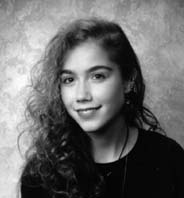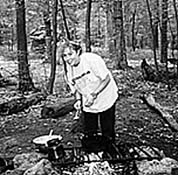
All my life I've wanted to help children know love, happiness, and pride, so that when they grew older they might realize their own dreams and help others do the same. Last summer I had the opportunity to find out if I could actually do it--to finally stop talking and start doing.
I chose the second; the one that traded salary for a challenging and what's proven to be an unforgettable experience.
The offer was from Trail Blazers, a New Jersey camp that offers a supportive, educational environment in a natural setting to children from the inner-cities in the New York area. Everyone at Trail Blazers lives in what is called a smallcamp, a group of eight campers and two or three counselors, situated far enough apart to function independently.
The thought of Trail Blazers' primitive camping didn't worry me--I've camped
that way before with my family. And a few years earlier I had been a volunteer
counselor at a Girl Scout camp. After two weeks of training that included
tips on successful counseling and a little child psychology, urban sociology,
and behavior management, I was eager to get started. Then I learned I and
two others--Brendan and Gary--would be supervising the youngest boys. My only
previous experience had been with girls, and I was surprised, and apprehensive,
to have been assigned a group of boys.
Gary and Brendan had been as nervous as I, but we soon found we had much in common, and we quickly became friends. Our working relationship, however, took a bit of effort on all our parts, but eventually we worked things out. Trail Blazers expects coworkers to display a successful relationship--one of the program's most unique and important aspects--to teach our charges about communication and cooperation--and to make each day go smoothly. We spent our first three days discussing counseling philosophies and high ideals. We knew we would be patient, loving, and fun, teaching the kids all about the environment and camping.
Then they arrived and all our plans went out the window. Our group was nothing like the well-behaved, enthusiastic one we expected. We didn't have the patience to be fun and loving after spending most of our time breaking up fights and helping the kids control their behavior long enough to sit through a meal or activity. Instead of teaching how to chop wood and paddle a canoe, we tied shoes, helped them make their beds and brush their teeth, and comforted the homesick. By the end of the week, we were exhausted, and worse, we were beginning to doubt our abilities and our decisions to be counselors.
The experience had brought out unexpected and less-than-ideal sides in us. But instead of giving up, we resolved to avoid impatience and frustration with better planning and more realistic goals for the next three-week-long session.
When the second session began, we were more prepared for the campers' strong and changeable moods. Many were like Joe*, a sweet, creative 8-year-old, who knew no other way to deal with anger or any negative emotion than to hit things with a stick. The children's city lives were frequently chaotic, so we worked on establishing routines and clear expectations: walking into the dining hall quietly, waiting until everyone had been served before eating, and passing cups and plates so that their contents wouldn't spill.
Every child had a job to do within the smallcamp, such as cooking, fire building,
or dishwashing--and every smallcamp had a job to do for the community, such
as cleaning the community latrines, feeding the two donkeys, or tending the
organic garden. Joe was one of the most articulate about declaring the pride
he felt in being given responsibilities and in knowing how to live outdoors,
but all them were growing more confident.
Halfway through the three-week session, the smallcamps embark on separate Vagabonds, backpacking trips during which campers put their new-found skills to use. We planned an overnight trip to a small cabin on the other side of the lake, mapping a course that took us the long way around on a hike several hours long; we would boat back the following day. The experience proved to be the summer's zenith for our group. When we arrived at the cabin, the kids were visibly proud of themselves. They'd used what they learned to complete a trip that would have been impossible three weeks earlier, and they experienced the thrill of achieving a difficult task. The trip brought us closer together, and during the last half of the session we truly functioned as a family.
As for me, despite my early doubt, the experience validated my lifelong dream. I had met the challenge I set for myself, but I also learned a lot about what I can do, and some about what I can't. And I felt the intense joy of helping some wonderful youngsters discover their potential and gain self-esteem and confidence.
I still receive letters from Joe. He went to Trail Blazers' holiday party in December, and returned to camp for Winter Weekend. He tells me he plans to return to camp this summer and how excited he is. I am too. I'll see him there.
* Not his real name.
Return to the OAM Spring 1997 Table of Contents